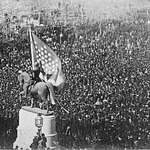James Holmes
Subject: The Upcoming Naval Battle in the South China Sea
Bio: J.C. Wylie Chair of Maritime Strategy at the Naval War College
Larry Bernstein:
Welcome to What Happens Next. My name is Larry Bernstein. What Happens Next is a podcast which covers economics, politics, and history.
Today’s topic is the Upcoming Naval Battle in the South China Sea.
Our speaker is James Holmes who is the J.C. Wylie Chair of Maritime Strategy at the Naval War College. Naval technology is changing rapidly, and I want to learn if the US fleet is capable of repelling a Chinese invasion of Taiwan, and what that conflict would look like.
This month is the 80th anniversary of the D-day invasion of France as well and the attack at Saipan in the Pacific. I want to learn from those two marine landings to understand the challenges that China will face if it wants to blockade or invade Taiwan.
Buckle up.
James, please begin with your opening six-minute remarks.
James Holmes:
This is the 80th anniversary of D-Day. The June 6th 1944 landings in Normandy. I look at D-Day as a strategic decision to open a new theater. We had theaters all over the globe going on during the Second World War: Atlantic, Pacific, and Mediterranean. If you go back to the writings of Clausewitz, our patron saint in professional military education, he lays out a framework for thinking through the decision to open a new theater.
He reduces it to what I call the three Rs: reward, risk and resources. For reward the concept is don't take your eye off your major goal for the sake of something that matters less. With regard to risk, he's worried about diverting resources from that major theater into something secondary. The decision to undertake the Normandy operation in 1944 was an easy one. American industry had fully geared up. It was turning out not only manpower but also material, and that eases the decision to open a new theater.
Because you can supply the Soviets fighting in the East, you can do Normandy, you can continue fighting in Italy, and in the Pacific within days after the Normandy landings, US forces made an amphibious invasion of the island of Saipan an operation of similar magnitude to D-Day. That simply speaks to the volume of American industry and military might back in the Second World War, and something that we could not match today.
Larry Bernstein:
Your first of Clausewitz's three Rs is reward. You explained that reward in this context means keeping your eye on the ball and not focusing on secondary battle initiatives.
This brings to mind the discussion between Churchill and Roosevelt immediately after Pearl Harbor in 1942 about where the allies should begin to fight the Germans. General Marshall wanted to take the war directly to the Germans in Europe.
Churchill said that a Normandy invasion would require several years of preparation, and that instead the Allied forces should invade North Africa and then move from there into Italy. Marshall opposed the North African invasion because the allies would be taking their eyes off the prize. Do you agree with Churchill or with General Marshall about where to locate America’s first theater operations in World War 2?
James Holmes:
That's a great question. General Marshall is the greatest soldier statesman of the 20th century, but I think he was just wrong on that one. He wanted to do a cross-channel invasion in 1942. But we weren't geared up to do major operational things until late 1943. It would've been a very hazardous undertaking in 1942.
From a material standpoint, I don't think we could have gotten it done. So, it made sense to do the North African swing to start cutting down on the Axis’s geographic holdings.
If you watch the old George C. Scott movie Patton that comes through pretty clearly that that was a proving ground for the United States Army and Army Air Force.
Larry Bernstein:
My previous podcast was with Greg Townsend and Eugene Kontorovich. The topic was on the International Criminal Court and the requirement of using proportionate firepower to minimize civilian deaths. The ICC is currently investigating Israel’s actions in Gaza to make sure that they are calibrating their military strikes to minimize civilian deaths.
Before D-Day, the allies bombed French territory to soften up the Germans before the invasion that resulted in the loss of life of around 50,000 French. How do you think about the inaccuracy of Allied aerial bombings and minimizing civilian deaths?
James Holmes:
Whenever we get into talking about the laws of war, I always make a recommendation of Michael Walzer's classic book.
Larry Bernstein:
Just and Unjust Wars.
James Holmes:
Wonderful book, and it belongs in anybody's library who does international relations and military stuff. He lays it out very clear. This is a way of thinking about the laws of war that hails back to the writings of Thomas Aquinas. They break it into two categories. Was the decision for war a just one, then what you were referring to, was it just conduct of war. And you are required to spare civilian populations as much as you can.
At the time, we had nothing like precision weaponry like we enjoy today. That gives you the ability to be discriminant. I think that's probably the reason that people still argue about air power over Europe because the impact on civilian populations was fearsome. In the case of France, which you mentioned, you're talking about dropping ordinance on your allies, which is a pretty fraught thing to do.
The standard is much higher now that we have precision arms, and you can send a missile through a particular window if you want to. I don't know what the court's going to do, but I haven't seen a reason to think that the Israeli defense force has been indiscriminate.
Larry Bernstein:
Next topic is Pearl Harbor. The Japanese objective was to destroy our carriers. And luckily on December 6th, the day before the attack, American aircraft carriers exited Pearl Harbor into the Pacific and were unharmed. The Japanese attack in Hawaii destroyed several battleships as well as most of the army’s aircraft.
Later, it turned out that the carriers were the key naval ship necessary to win the war, and that the battleships proved to be less important than in First World War. This month is 80 years from D-Day. This is forever ago in terms of military technological development. Is the aircraft carrier still important to naval engagement? Has technology changed the nature of naval warfare?
James Holmes:
I am a battleship sailor myself so that strikes close to home. The battleship became obsolete after Pearl Harbor. The battleship was no longer the main striking arm of the fleet. It did find value as an escort role, and a critical enabler to help troops get ashore, consolidate buildup, and resources.
As far as the carrier today, we're at an inflection point. The carrier is still a valid platform. It certainly has lost none of its offensive striking power. And the nature of shore-based defenses has gotten to be so forbidding that we're in a danger zone as far as fortress China or fortress Russia being able to reach out from land, not only with missiles, but also with drones and combat aircraft of all types, and strike maritime forces at sea.
We're in a danger zone right now where shore-based defenses have the advantage. But you might see the balance swing back. It's a cyclical thing.
Larry Bernstein:
I want to apply Clausewitz 3 Rs: risk, reward, and resources to the American World War II strategy in the Pacific theater. Tell us about our military strategy in the war with Imperial Japan and its relevance for a potential conflict with the Chinese.
James Holmes:
Our Chinese friends are great students of history. They're determined to learn from the past and avoid the mistakes of past powers including Imperial Japan.
Pearl Harbor was not the Japanese game plan heading into 1941. The game plan was to let the U.S. Pacific fleet come to Japan after an attack on the Philippine Islands. The idea was that Japanese submarines would subject the U.S. Pacific fleet to the death of a thousand cuts so that somewhere in the Western Pacific, the Imperial Japanese Navy could come out and have a fight with a reasonable chance of overcoming the U.S. fleet. That's what we today would call an anti-access area denial strategy, weaken the adversary as he comes, and ultimately go out and fight a decisive engagement and win.
Larry Bernstein:
How will China’s strategy today differ from Imperial Japan’s?
James Holmes:
The basic ideas are the same except the Chinese don't need to occupy islands because they can reach way offshore in aircraft and missiles and start subjecting today's U.S. fleet to that same bombardment as it tries to close in on the Western Pacific, and overturn aggression in the Taiwan Strait, South China Sea, wherever the battleground might be. So that's their anti-access area denial strategy.
The one other big thing they will not leave our logistics alone. The Japanese made a grave error, overlooking submarine warfare. The U.S. Pacific Fleet submarine force the order went out on December 7th, 1941, get underway and sink anything flying a Japanese flag. And the Japanese didn't adapt well to that, and they also didn't use their own submarine force to attack our shipping, oilers, freighters that you need to conduct a Transpacific offensive.
I can guarantee you that our Chinese friends will not make the same mistake. If you gave me a command of the PLA, the People's Liberation Army, Air Force and Navy, that's where I would destroy the US combat logistics fleet. And the battle fleet will go away without fuel, without stores. Even nuclear-powered aircraft carriers, the ships can go on forever, but its planes can't. A carrier needs fuel every few days if it's conducting regular air operations. So go after the soft targets like oilers and ultimately the battle fleet withers on the vine, and that leaves China in a very good position vis-a-vis Taiwan, Japan or whoever the adversary might be.
Larry Bernstein:
China has 14 neighbors with land borders, almost all of them are hostile to them. China’s neighbors desire Chinese foreign direct investment, Chinese technology. and Chinese trade, but they don't want China to blow them up. How is China pushing their neighbors around?
James Holmes:
China has gotten very good at purloining maritime territory without resorting to violent force. And this is what we call Gray Zone Operations. We thought we had settled the questions inherent in the UN Convention on the Law of the Sea for all time, i.e. coastal states do not own the sea. And yet back in 2009, China reopened that debate and it contends that it is the sovereign power over 80% to 90% of the South China Sea, including waters allocated to the Philippines, Vietnam, Indonesia by treaty.
It doesn't want to use the PLA Air Force and Navy to anchor its claims there. So that's why you see pictures of fishing boats occupied by maritime militia. Let the fishermen appear to be doing their business, back them with the China Coast Guard, the world's biggest and most heavily armed. And then should some local power resist the China Coast Guard, then back it up with military force. This is China's way of trying to get what it wants in a territorial sense without resorting to force and provoking a huge blowback from the Philippine Islands, Japan and so forth.
Larry Bernstein:
India is part of the quad with the United States, Australia, and Japan. It is not an alliance but a mutual agreement to work together to contain Chinese aggression. The Indian Ocean is enormous and it will be challenging for the Chinese to defend its shipping and its borders from US attacks.
In US war games after a Chinese invasion of Taiwan, India opted out of the fighting. But if the United States chooses to attack China in the Indian Ocean will India support us?
James Holmes:
India sees itself as a benign hegemon in the Indian Ocean region. It wants to be number one, but it also wants to be known as an inoffensive great power. It doesn't use military power to do imperial-like things. It's willing to work with the United States and its partners, but I don't think that you're going to get a formal alliance commitment out of them.
India has a fair amount of Cold War baggage to get over vis-a-vis the United States. The United States supplied India with some military hardware during the Cold War, and it had a bad habit of withholding spares and support for that hardware when India would get in the scrap with Pakistan in the 1970s. In the 1971 war, which gave rise to Bangladesh, a partition of Pakistan by India, the Nixon administration sent the USS Enterprise Carrier task force into the Bay of Bengal. Indians interpreted that as a clumsy ham-handed way to discourage Delhi to defeat Pakistan.
India is becoming a capable power. I don't think things are going to have to get truly dire for India to join in an alliance commitment.
Larry Bernstein:
Can you explain how India’s military can shift the balance of power in the Indian Ocean to benefit the US in a fight with China?
James Holmes:
There's a concept in warfare called the interior and exterior lines. Basically, if you are a combatant on the interior lines, looking at an adversary, it's like being at the center of a circle. You can shift forces around to meet attacks around the circumference of that circle. Interior lines have direct short routes. The powers on the exterior lines have to move great distances around the circumference of the circle to do things to you.
China is the interior power in East Asia looking at the United States and its partners. But in the Indian Ocean that script gets flipped. India is now the interior power and commands those advantages off its coasts. So even though it has a Navy that's less than half the size of China's, that Navy is very well positioned to do things simply because it's playing on home ground.
Larry Bernstein:
The lesson from one of my favorite movies The Princess Bride.
James Holmes:
Yeah, loved it.
Larry Bernstein:
Was to avoid a land war in Asia. Is there any chance for a US invasion of China?
James Holmes:
It's almost unthinkable that we would ever invade China. I can't conceive that we would put ground forces ashore. The one exception I could see would be a replay of the Korean War. If Kim Jong-un decides to invade the South, we have operational control of Korean forces. That would probably be the only exception to the Princess Bride’s thesis. But as far as landing forces in China, I'm just not seeing it.
Larry Bernstein:
If China moves aggressively against Taiwan, will China choose to blockade the island? And if so, would you recommend that Taiwan stockpile food, mines and missiles to undermine China’s naval blockade? Tell me about preparation for this conflict.
James Holmes:
I hope our Taiwanese friends are taking this seriously. Taiwan is very dependent on external shipments of resources. A blockade is probably China’s most likely course of action simply because trying to invade across the Taiwan Strait is difficult.
We started off talking about D-Day. 20 years ago, the Rand Corporation, did a study of a potential Chinese cross strait offensive and overlayed it onto the map of Normandy from 1944. The beaches are about the same proportions. Taiwan's much farther away from the Chinese seacoast than France is from Great Britain. The Chinese are trying to get ready. They're not only building amphibious warships, but they also fit out their commercial fleet for dual military use so they can use it to ferry troops across. But China is still not there.
Aside from stockpile and the necessities of life, Taiwan needs to make itself into a porcupine. How do you do that? Well, you do it using anti-ship missiles obtaining in bulk.
Larry Bernstein:
What lessons can Taiwan learn from Ukraine that has successfully defeated the Russian Navy in the Black Sea?
James Holmes:
For listeners who want to get smart on Ukraine, there's a place on the web called the Institute for the Study of War, and they have a daily briefing. They’ve done a lot of things with aerial and surface drones. Sometimes wacky stuff. You take a jet ski and put a bomb on it. They've excelled at striking Russian ships that are stationary, including in dry docks in Crimea. Looking for ways to inexpensively create military technology given that you're woefully outmatched by material measures vis-a-vis Russia. I've been astonished how well they've done at sea, given that they have no Navy, but they've inflicted about 30% casualties on the Black Sea fleet.
Larry Bernstein:
The US has an existing navy with a fleet of aircraft carriers and a supporting fleet. The Chinese are starting their navy from scratch. They have a clean sheet of paper. How does having an existing fleet hurt us as technology evolves?
James Holmes:
Once you get that culture built up around a successful tradition, it's hard to go against it. Our Navy has been for a decade been talking about distributed maritime operations. The idea that we're going to take this fleet of big and pricey warships that are vulnerable, we're going to break it up into swarms of small craft that we can buy in bulk and fan them out in the Western Pacific to make things tough on China.
But we have made very little progress towards doing that. Traditions within the services, bureaucratic imperatives, congressional pushback against cutting back on jobs in various districts, there's just a ton of things that have made us very sluggish.
Larry Bernstein:
I end each podcast with a note of optimism. How can we deter a Chinese conflict and push them in the direction of a peaceful coexistence?
James Holmes:
Having studied China and Xi Jinping for a couple of decades now, I think President Xi is rational, and therefore, he's susceptible to deterrence. Now, the caveat to that is I thought the same thing of Vladimir Putin, but then he pulled the trigger in Ukraine. But my take on Xi Jinping, he is somebody who can be deterred. We need to do that on a day-by-day basis. If every morning when Xi Jinping wakes up and he says, today is not the day, you deterred him incrementally. If enough of those days add up, maybe good things happen over time. We have a lot of advantages. Our bench of allies is very deep.
We're starting to correct the problems that beset us after the Cold War in terms of military implements, tactics, operational concepts and so forth. I don't lie awake nights worrying about China. Daytime yes, but not so much at night.
Larry Bernstein:
Thanks, James, for joining us today.
If you missed our previous podcast, check it out. The topic was Abolishing the International Criminal Court. Our first speaker was Eugene Kontorovich who is a Professor of Law at the George Mason Antonin Scalia Law School and our second speaker was Greg Townsend who is a former prosecutor who worked for the ICC tribunals in Rwanda, Yugoslavia, Kosovo and Lebanon. We discussed the origin and purpose of the International Criminal Court, and why the ICC is heading in the direction of issuing arrest warrants for Prime Minister Netanyahu.
The speakers explained what it means that the ICC is a court of last resort. We also debated whether the ICC is trying to influence domestic politics in Israel. Our two speakers were on polar opposite sides of whether the ICC should issue arrest warrants for the Israeli officials and whether the ICC should even exist.
I would like to make a plug for next week’s podcast about the 1968 Presidential Campaign between Richard Nixon, Hubert Humphrey and George Wallace. Our speaker will be Luke Nichter who is the author of the new book entitled the Year That Broke Politics: Collusion and Chaos in the Presidential Election of 1968. There is much to learn from previous elections, especially because that election was so polarized and the third-party candidate played such an important spoiler role.
You can find our previous episodes and transcripts on our website whathappensnextin6minutes.com. Please subscribe to our weekly emails and follow us on Apple Podcasts or Spotify. Thank you for joining us today, good-bye.
Check out our previous episode, Abolishing the International Criminal Court, here.











The Upcoming Naval Battle in the South China Sea